11 - Restoring pensions collectivism: a new public pension for the UK
Published online by Cambridge University Press: 22 December 2023
Summary
The impact of Covid-19 on UK pension provision has been, and will be, profound. Yet, just like the impact of Covid-19 on society in general – public services, the economy, our democracy, etc. – it is an impact that is significantly worse as a result of decades of mismanagement, corporate influence and ideological myopia in UK pension policy. I argue that a (wilful) misunderstanding of the elementary nature of pension provision among UK policy-makers is part of the explanation, creating myriad market failures that the state is intervening to mitigate and that would have been unnecessary had the system been designed more coherently around state-led provision in the first place.
Although the UK's pension problems pre-date Covid-19, the pandemic provides a useful, but tragic, illustration of the system's frailties. These frailties, of course, depend on whether the form of provision in question is (collectivist) defined benefit or (individualized) defined contribution provision. In defined benefit provision, a severe economic shock does not directly impact upon member outcomes, but falling asset values create funding deficits, and make employers less able and/or willing to compensate for shortfalls, which jeopardizes future provision. In defined contribution provision, member outcomes are entirely on how their own invested savings perform in capital markets – and those closest to retirement are acutely affected, as they have little or no time to recover from a period of poor returns. In the absence of any other safe haven assets, pension institutions tend to flock to government bonds – yet gilt yields are at historically low levels, in part as a direct result of macroeconomic policy.
The centrality of investment returns to UK pensions indicates that the country's provision has always been highly financialized. This has shaped understandings of a “crisis” associated with population ageing. The expectation that employers guarantee defined benefit outcomes – as the ratio of active, working-age members to retired members drawing a pension income has declined – has driven the rollout of defined contribution provision, whereby individuals alone shoulder the longevity risks.
- Type
- Chapter
- Information
- The Return of the StateRestructuring Britain for the Common Good, pp. 137 - 146Publisher: Agenda PublishingPrint publication year: 2021



